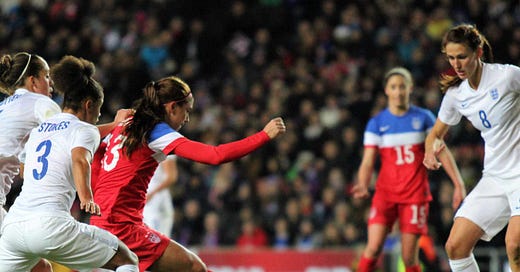The Women’s National Team Is Not Asking For Equal Pay
They’re asking for an objectively better deal than the men have
“Equal pay” is one of the pithy, three-syllable slogans that Americans love to chant. Others include “build the wall”, “drain the swamp”, and the one that I mentally chant when confronted with any of these: “Kill me now!”
Only an asshole could be against equal pay. But what, exactly, constitutes equal pay? The three-syllable chant doesn’t say. And yet, the chant seems like a highly-nuanced Socratic debate compared to an incurious new documentary about the U.S. Women’s National Team’s lawsuit against U.S. Soccer. The film -- which is called “LFG”, though a more accurate reflection of it's content would be “Megan Rapinoe: Like Gandhi But More Kick-Ass" -- makes Reefer Madness look thoughtful and balanced. It chronicles the WNT’s fight for “equal pay”, but defines “equal pay” in a way that’s objectively and demonstrably unequal. Because -- and viewers of the film could be forgiven for not knowing this -- the WNT is not asking to be paid the same as the men. They are asking to be paid substantially more than the men.
LFG frames the issue in the most black-and-white way possible. They point out -- correctly -- that the U.S. men get larger bonuses for playing games than U.S. women. So, bam: sexism, according to the filmmakers. There’s never any hint that the issue might contain a smidgen of complexity. Incredibly, arguments for both sides of the dispute are presented by the union lawyer representing the WNT.1 Because that’s what you do when you want a fair look at an issue: you have one side’s lawyer give you both arguments. Like how if you want an honest discussion of the O.J. Simpson case, you go to Robert Shapiro so that he can give you both the “O.J. is innocent” side of the case and the “Ron Goldman killed O.J.” side. It’s called “balance”.




